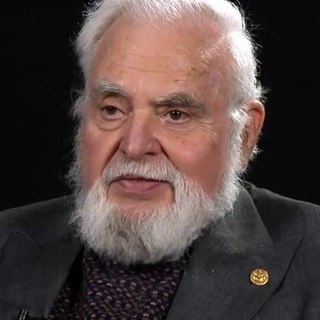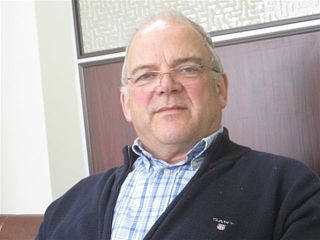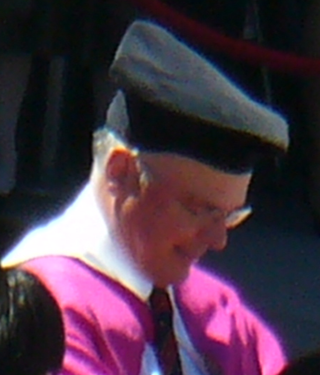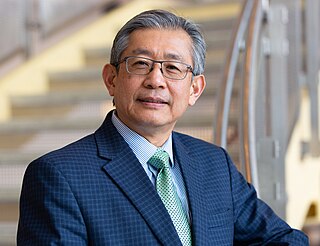Related Research Articles

Robert Gray Gallager is an American electrical engineer known for his work on information theory and communications networks.

Solomon Wolf Golomb was an American mathematician, engineer, and professor of electrical engineering at the University of Southern California, best known for his works on mathematical games. Most notably, he invented Cheskers in 1948 and coined the name. He also fully described polyominoes and pentominoes in 1953. He specialized in problems of combinatorial analysis, number theory, coding theory, and communications. Pentomino boardgames, based on his work, would go on to inspire Tetris.
José Manuel Nunes Salvador (José) Tribolet is a Portuguese engineer, and Professor of Information Systems at the Instituto Superior Técnico - University of Lisbon, Portugal, who became known for his work on speech coding in the late 1970s.

Robert Calderbank is a professor of Computer Science, Electrical Engineering, and Mathematics and director of the Information Initiative at Duke University. He received a BSc from Warwick University in 1975, an MSc from Oxford in 1976, and a PhD from Caltech in 1980, all in mathematics. He joined Bell Labs in 1980, and retired from AT&T Labs in 2003 as Vice President for Research and Internet and network systems. He then went to Princeton as a professor of Electrical Engineering, Mathematics and Applied and Computational Mathematics, before moving to Duke in 2010 to become Dean of Natural Sciences.
Joachim Hagenauer is an information theorist and professor emeritus at Technical University of Munich. He pioneered the use of soft bits, a coding theory technique that contributes to the high performance of the turbo codes.
Michael Athans was a Greek-American control theorist and a Professor Emeritus in the Department of Electrical Engineering and Computer Science at the Massachusetts Institute of Technology. He was a Fellow of the IEEE (1973) and a Fellow of the AAAS (1977). He was the recipient of numerous awards for his contributions in the field of control theory. A pioneer in the field of control theory, he helped shape modern control theory and spearheaded the field of multivariable control system design and the field of robust control. Athans was a member of the technical staff at Lincoln Laboratory from 1961 to 1964, and a Department of Electrical Engineering and Computer Science faculty member from 1964 to 1998. Upon retirement, Athans moved to Lisbon, Portugal, where he was an Invited Research Professor in the Institute for Systems and Robotics, Instituto Superior Técnico where he received a honoris causa doctorate from the Universidade Técnica de Lisboa in 2011.

Adrianus Johannes "Han" Vinck is a Dutch computer scientist. He serves as senior professor in Digital Communications at the University of Duisburg-Essen, Germany, since September 2014. He is a member of the digital signal processing group at the electrical engineering Department. His interest is in Information and Communication theory, Coding and Network aspects in digital communications. He is the author of the textbook Coding Concepts and Reed-Solomon Codes.
Elza Erkip is a Turkish-American electrical and computer engineer, professor and wireless technology researcher at New York University.
Alexander Vardy was a Russian-born and Israeli-educated electrical engineer known for his expertise in coding theory. He held the Jack Keil Wolf Endowed Chair in Electrical Engineering at the University of California, San Diego. The Parvaresh–Vardy codes are named after him.

David A. B. Miller is the W. M. Keck Foundation Professor of Electrical Engineering at Stanford University, where he is also a Professor of Applied Physics by courtesy. His research interests include the use of optics in switching, interconnection, communications, computing, and sensing systems, physics and applications of quantum well optics and optoelectronics, and fundamental features and limits for optics and nanophotonics in communications and information processing.
Jianwei Huang is a Chinese engineering researcher and educator. He is a Presidential Chair Professor and Associate Dean of the School of Science and Engineering, The Chinese University of Hong Kong, Shenzhen. He is also an Adjunct Professor in the Department of Information Engineering at the Chinese University of Hong Kong. He is a guest professor of Southeast University.

Bruce Edward Hajek is a Professor in the Coordinated Science Laboratory, the head of the Department of Electrical and Computer Engineering, and the Leonard C. and Mary Lou Hoeft Chair in Engineering at the University of Illinois at Urbana-Champaign. He does research in communication networking, auction theory, stochastic analysis, combinatorial optimization, machine learning, information theory, and bioinformatics.
Ranjan Kumar Mallik is an Indian electrical and communications engineer and a professor at the Department of Electrical Engineering of the Indian Institute of Technology, Delhi. He held the Jai Gupta Chair at IIT Delhi from 2007 to 2012 and the Brigadier Bhopinder Singh Chair from 2012 to 2017. He is known for his researches on multiple-input multi-output systems and is an elected fellow of all the three major Indian science academies viz. Indian Academy of Sciences, Indian National Science Academy, and The National Academy of Sciences, India. He is also an elected fellow of The World Academy of Sciences, Indian National Academy of Engineering, and The Institute of Electrical and Electronics Engineers, Inc.
Emina Soljanin is a Distinguished Researcher at Bell Labs who was named Fellow of the Institute of Electrical and Electronics Engineers (IEEE) in 2014 for contributions to coding theory and coding schemes for transmission and storage systems.

Xi Zhang is a Full Professor and the Founding Director of the Networking and Information Systems Laboratory, Department of Electrical and Computer Engineering, Texas A&M University. He is a Fellow of the IEEE for contributions to quality of service (QoS) in mobile wireless networks. His research interests include statistical delay-bounded QoS provisioning for multimedia mobile wireless networks, edge computing, finite blocklength coding theory, in-network caching, and offloading over 5G mobile wireless networks.
Rhonda Franklin is a Professor of Electrical and Computer Engineering at the University of Minnesota. She is a microwave and radio frequency engineer whose research focuses on microelectronic mechanical structures in radio and microwave applications. She has won several awards, including the 1998 NSF Presidential Early Career Award for Scientists and Engineers, the 2013 Sara Evans Leadership Award, the 2017 John Tate Award for Excellence in Undergraduate Advising, and the 2018 Minnesota African American Heritage Calendar Award for her contributions to higher education.
Muriel Médard is an information theorist and electrical engineer. She is the Cecil H. Green Professor of Electrical Engineering at the Massachusetts Institute of Technology (MIT) and is known for her research in network coding.

Salman A. Avestimehr is a Dean's professor at the Electrical & Computer Engineering and Computer Science Departments of University of Southern California, where he is the inaugural director of the USC-Amazon Center for Secure and Trusted Machine Learning and the director of the Information Theory and Machine Learning (vITAL) research lab. He is also the CEO and Co-Founder of FedML. Avestimehr's contributions in research and publications are in the areas of information theory, machine learning, large-scale distributed computing, and secure/private computing and learning. In particular, he is best known for deterministic approximation approaches to network information theory and coded computing. He was a general co-chair of the 2020 International Symposium on Information Theory (ISIT), and is a Fellow of IEEE. He is also co-authors of four books titled “An Approximation Approach to Network Information Theory”, “Multihop Wireless Networks: A Unified Approach to Relaying and Interference Management”, “Coded Computing”, and “Problem Solving Strategies for Elementary-School Math.”

K. J. Ray Liu is an American scientist, engineer, educator, and entrepreneur. He is the founder, former Chief Executive Officer, and now Chairman and Chief Technology Officer of Origin Wireless, Inc., which pioneers artificial intelligence analytics for wireless sensing and indoor tracking.
Giuseppe Caire is an Italian telecommunications engineer.
References
- ↑ "Home page". Archived from the original on 2013-10-25. Retrieved 2013-11-08.
- ↑ "Hendrik C Ferreira - Google Scholar Citations". scholar.google.co.za. Retrieved 2018-01-09.
- ↑ "Best Readings in Power Line Communications | IEEE Communications Society". www.comsoc.org. Retrieved 2018-01-09.
- ↑ "Obituary by Han Vinck" (PDF). Retrieved 2020-08-08.